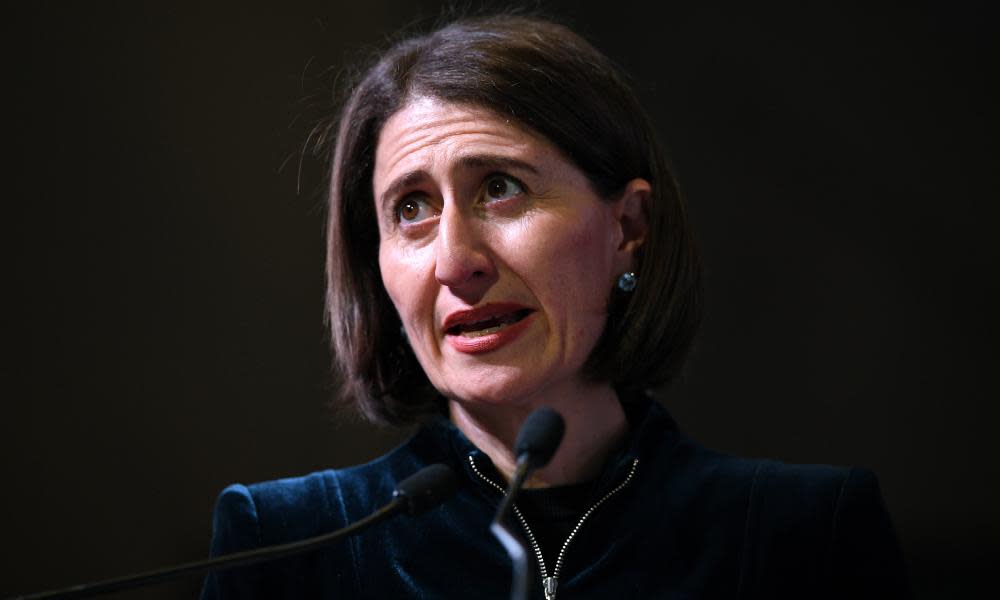Drug deaths inquest: Gladys Berejiklian says she is 'closing the door' on pill testing

The New South Wales government will ignore the bulk of the recommendations from a landmark inquest into drug deaths at music festivals, with the premier, Gladys Berejiklian, saying she is “closing the door” on pill testing.
On Wednesday, the government announced its response to the findings of deputy state coroner Harriet Grahame’s inquest into six drug-related deaths of young people at music festivals in the state.
Handed down last month, the long-awaited report recommended the government introduce a pill-testing trial, limit the use of strip-searches at music festivals to cases of suspected drug supply and stop the use of sniffer dogs.
Related: NSW coroner to recommend pill testing be introduced at music festivals
But the government has ignored the majority of the recommendations from the inquest, instead saying it would introduce drug amnesty bins at music festivals to allow festival-goers in the state to discard illegal substances “without fear of prosecution or penalty”.
“What we want to do is send a strong message out to young people which is the most important one: do not panic if you see police officers, if you see anything that worries you because you’ve got pills on your person or your friends do, just throw the pill away, no questions asked,” she said.
“Just don’t take them because that can kill you or kill one of your friends.”
While the government has maintained a steadfast opposition pill testing, the premier’s refusal to adopt the coroner’s recommendation was immediately criticised by advocates and both Labour and the Greens.
The emergency doctor David Caldicott, a long-time pill testing advocate who has overseen the only Australian trial of the method in ACT, wrote on Twitter that he found it “hard to recall a time when a politician has announced that they are ‘closing the door’ on any health intervention that has as much expertise behind it”.
Greens MP Cate Faehrmann said amnesty bins “on their own will not save lives”.
“My fear is that police will use amnesty bins as an excuse to increase their intimidation tactics in the hopes that they can scare kids into throwing away their drugs,” she said.
“The war on drugs has proven that a focus on getting people to not take drugs doesn’t work. If we can’t keep drugs out of prisons we’re not going to keep them out of festivals.
“The reality is that thousands of people will still take drugs at festivals. Amnesty bins will do nothing to reduce the harms of drug use for those inside.”
While she said some recommendations might still be considered in the future, Berejiklian said that she was “closing the door” on pill testing as an option as well as incorrectly claiming the method was unable to check drug purity.
“Certainly I read the findings of the deputy coroner’s report and it was harrowing reading and if you look at the causes of deaths of those young people, it was pure MDMA in five out of the six cases and in the sixth case was the combination of cocaine and MDMA,” she said.
“None of those lives would have been saved [by pill testing] because it was pure MDMA that killed those young people.”
In fact the inquest heard that purity testing had been available at music festivals in Europe for several years and in her findings Grahame wrote that though it was more expensive, claims pill testing couldn’t check for purity were “clearly incorrect”.
In her findings, Grahame wrote that she was satisfied there was “significant evidence” that “intensive and punitive drug policing operations” were increasing “drug-related risks and harm” and called for a complete overhaul of government policy including the decriminalisation of possession.
“I am of the firm view there is sound evidence that high-visibility policing and the use of drug dogs is a harmful intervention,” Grahame said at the time.
The “wholesale practice of strip-searching young people” was of “grave concern”, and its use to target people suspected of drug possession was “out of line with the purposes” of the legislation.
Related: Pill testing at Groovin the Moo festival potentially saves seven lives, organisers say
Standing beside both the commissioner of police Mick Fuller and police minister David Elliott – both vocal supporters of strip search tactics – Berejiklian said the force was “reviewing the operations of how strip-searches are conducted and to make sure that police follow the letter of the law”.
Berejiklian has long resisted calls to introduce pill testing in the state despite a long list of medical bodies calling for it to be used. On Wednesday she said people should take “personal responsibility” for drug use.
“I will say today don’t take those pills,” she said.
“That is the strongest message we can send to everybody. Please don’t take these pills. These pills can kill you. At the end of the day there is also, and I know, I have to be careful how I use my words, but there is also a level of personal responsibility here.
“People have to step up and acknowledge that if you take a pill, if you take multiple pills, it can kill you, it can kill your friends.”

 Yahoo News
Yahoo News 
